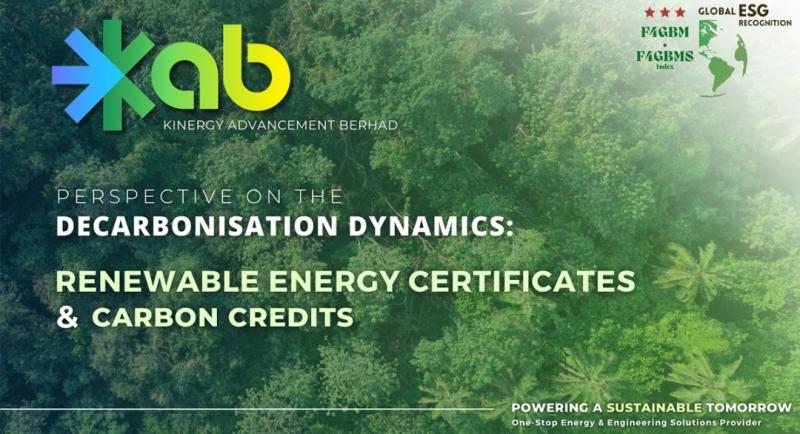KAB’S Perspective on the Decarbonisation Dynamics: RECs and CC
In an era where sustainability shapes our decisions, Kinergy Advancement Berhad (KAB) stands at the forefront of the clean energy transition. Their perspective on Renewable Energy Certificates (RECs) and Carbon Credits (CC) reflects a deep understanding of the complexities and potentialities in harnessing energy sources for a sustainable future. KAB's approach underlines the necessity for businesses to manage their impact on the environment, particularly their carbon footprint, through innovative and strategic use of RECs and CC.
Decarbonisation of Malaysia's Electricity Sector
KAB recognises the significant role of the electricity sector in Malaysia's decarbonisation journey. The market’s burgeoning support for sustainability highlights the importance of green energy procurement and environmental stewardship. In this context, RECs emerge as a simple yet effective method for companies to align with their renewable energy goals while adhering to regulatory compliance. These tradeable certificates represent the displacement of conventional power with renewable energy, allowing companies to substantiate their contributions to reducing the impacts of climate change.
The Green Energy Tariff (GET) program, supported by Malaysia’s Energy Commission and the Malaysia Renewable Energy Certificate (mRec), exemplifies a national initiative aligning with KAB’s vision. This initiative provides consumers with low-carbon electricity options, thereby reducing their carbon footprints and supporting the nation’s renewable energy agenda. The GET program not only contributes to the diversification of Malaysia’s energy mix but also resonates with the objectives of the National Energy Transition Roadmap (NETR).
The Role and Impact of Carbon Credits
While RECs focus on Scope 2 emissions, CC tackles both Scope 1 and Scope 3 emissions, offering a comprehensive framework for reducing greenhouse gas (GHG) emissions in the atmosphere.
KAB offers a dual perspective on the value of CC:
Offsetting Emissions: CC allows companies to offset their carbon dioxide or other GHG emissions (one carbon credit equivalent to one ton of carbon dioxide) up to a certain limit. Companies with surplus credits have the option to sell these unused credits to others, promoting a responsible approach to emission management.
Options for Expansion and High Emission Companies: For companies looking to expand or those with high emissions, CC offers an alternative to raising their emission caps. This mechanism enables these companies to manage their growth sustainably while being accountable for their emissions.
The adoption of market-based approaches like the Emission Trading Schemes (ETS) or Cap-and-Trade systems demonstrates a commitment to balancing profitability with sustainability. These systems provide a platform for companies to trade emission allowances, fostering accountability and encouraging climate action.
Market Dynamics and Regulatory Challenges
KAB acknowledges that the success of RECs and CC is influenced by market dynamics, including fluctuating prices of these instruments and regulatory uncertainties. Achieving a balance between environmental responsibility and economic viability within these frameworks is crucial. The launch of the Voluntary Carbon Market (VCM) by Bursa Malaysia is a step toward maintaining competitiveness while promoting carbon project development and international recognition.
Global Goals, Local Challenges
KAB’s practices, which are recognised by FTSE4Good Bursa Malaysia (F4GBM) Index and FTSE4Good Bursa Malaysia Shariah (F4GMS) Index,are not only in line with global emission reduction initiatives but also evidence their contribution towards these goals. The consensus on how RECs and CC can contribute to these goals varies, with local regulatory landscapes being one primary factor among others. Malaysia’s commitment to reducing greenhouse gas intensity is a positive step, but achieving these targets requires navigating a labyrinth of emission standards, renewable energy targets, and market peculiarities.
KAB's Understanding and Position in the RE Market
KAB believes that the future growth and contribution of all businesses, including its own, to the renewable energy sector, will depend on adaptability to regulatory changes and market conditions. This involves not only understanding but also innovating within the renewable energy sector and engaging in market-based solutions. KAB's approach is to navigate these dynamics thoughtfully, considering the broader implications for sustainability and emission reduction.
The journey towards decarbonisation, though filled with challenges, will not impede the necessity to progress and change for a sustainable future. With its strong commitment to advancing the market's evolution and to position itself as a leading player as well as an active participant in our nation's energy transition, KAB seeks to spearhead innovation and drive positive change in the energy sector with its 26-years of expertise as a holistic Energy Specialist.
This content is provided by Kinergy Advancement Berhad
RM12.50 / month
- Unlimited access to award-winning journalism
- Comment and share your opinions on all our articles
- Gift interesting stories to your friends
- Tax deductable
